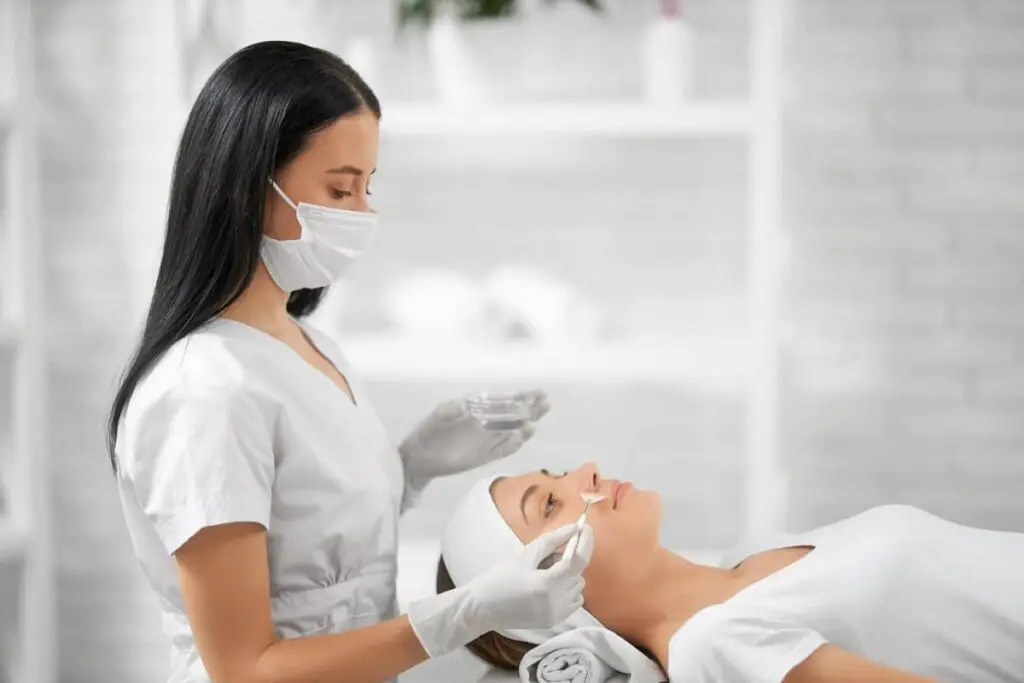Acne treatments come in so many forms that it can be challenging to determine the most effective for your skin type.
No matter how long you’ve suffered from acne, adult acne might be different from teenage acne and more challenging to treat because of factors such as hormones, skin type, texture changes, and even scarring.
As there are so many acne-fighting skin care products on the market, knowing what ingredients to search for is essential. Let’s see some chemical ingredients & the best natural alternative to them.
The Best Acne Skin care Products and Treatments
Listed here are the top chemical ingredients for acne remedies for occasional and mild acne.
Salicylic Acid
Pimple cures for teens rely on salicylic acid. If you’re looking for acne-fighting products in your local drugstore, you’ll find it the active ingredient in most of them. Sulfasalicylic acid helps by lowering inflammation and unclogging pores to reduce pimples.
As an anti-inflammatory agent, salicylic acid helps treat inflamed cystic breakouts that can occur when hair follicle obstructions rupture beneath the skin.
Although salicylic acid can be used in a face wash, some people prefer to use it as a moisturizer, toner, or leave-on spot treatment because it takes longer to work.
For sensitive skin, using only one product with salicylic acid daily is best, as overuse might cause dryness.
Glycolic Acid
As an alpha hydroxy acid (AHA), glycolic acid gently exfoliates the skin, removing the dead skin cells that can block pores and making the skin appear smoother.
In the same way that salicylic acid is found in many beauty products, glycolic acid may be found in many of the same products.
Benzoyl Peroxide
A powerful antibacterial agent, benzoyl peroxide kills the bacteria responsible for causing acne. Benzoyl, on the other hand, does have some disadvantages.
If you’re not careful, the leave-on creams and cleansing procedures might dry out your skin and ruin your clothes.
Stay away from benzoyl peroxide formulas with more than a 2% active component, as these are harsher on your skin and less effective at killing bacteria.

Lactic Acid
As an AHA (alpha hydroxy acid), lactic acid exfoliates the skin like glycolic acid. The milder nature of this acid makes it an excellent choice for those with sensitive skin who want to use an exfoliating acid but don’t want to use glycolic acid—additionally, lactic acid functions as both a humectant and a moisturizing agent.
Lactic acid exfoliants are a good choice for people with dry or sensitive skin because they don’t irritate the skin. Chemical peels can be performed at home using these acne-fighting products.
Retinol
Anti-aging retinoid treatments are well known, but these vitamin forms are also effective at clearing acne. Retinoids work to reduce inflammation, which is at the root of acne.
Retinal
There are other over-the-counter retinoids besides Retinol, and retinol isn’t the mildest of them all. People with sensitive skin may want to consider using products containing retinol (also known as retinaldehyde) rather than the more common retinol.
Similar to retinol, this naturally occurring retinoid is transformed into retinoic acid by the body. Retinol and other retinoids have been proven effective in a few tests, although this one had fewer adverse effects.
Adapalene
Synthetic retinoid Adapalene, also known as Differin, was formerly only accessible with a prescription but is now sold over-the-counter. Fortunately, it’s available without a prescription, making it an excellent alternative to prescription acne medications.
Other prescription acne drugs are harsher than this because of their synthetic composition. Adapalene is a superb option for people who have outgrown the milder effects of over-the-counter retinol but don’t want to commit to the full strength of a prescription retinoid.
Sulfur
The smell of sulfur is described as being similar to that of decaying eggs. If you have pus-filled zits or whiteheads, this chemical may help speed up the drying process so that your skin can heal more rapidly. As a result, it can be put to use.
This apparatus is responsible for removing the oil after it has been sucked up. It is usual practice to add other active compounds as well as perfumes to mask the smell of sulfur to get the most out of it. It’s commonly found in face masks and spot treatments as well.
Bakuchiol
Retinol alternatives such as this one, which is an extract derived from plants, do not contain retinoids. Bakuchiol research is still in its early stages, but preliminary findings suggest that it may be able to improve skin texture and reduce fine wrinkles without causing the side effects that are typically associated with retinoids.
It is possible to improve the efficacy of acne treatments and anti-aging products by mixing them with retinol at a low dose. Despite this, the possibility of retinol’s side effects cannot be eliminated.
According to the findings of recent studies, it seems to be an extremely efficient method of treating acne among individuals of color.
Dapsone Gel
Your dermatologist might advise using this product if you have acne. Dapsone efficiently gets rid of the bacteria that cause acne because of its anti-inflammatory and antibacterial properties.
It is common practice to combine dapsone treatment with the administration of other acne treatments. Like many other treatments, this can potentially leave the skin dry.

A Cortisone Shot
Large cystic acne lesions, in particular, respond well to cortisone therapy. In 24 to 48 hours, the pimple will be significantly reduced and may even disappear after receiving a corticosteroid injection from a dermatologist.
Inflammation is reduced by the treatment, which makes it ideal for treating cystic acne as well as hormonal breakouts. Mistaken injections can result in an eight-week skin slump after receiving a cortisone shot. It is not suggested to use this procedure regularly unless necessary.
Now, you know how to get rid of acne, but here is the thing, chemicals will affect your skin in another way. It could result in skin rashes or another skin disease. And the worst thing is, after using them for years, you can’t do much to cure it. So, what’s the solution then?
The solution is simple, go natural. Have a skincare routine with only 100% natural products that are free from chemicals and any side effects.
The best brand that develops 100% Natural products is HERBCIENCE. I personally recommend using HERBCIENCE for multiple reasons.
Why HERBCIENCE
They manufacture 100% Natural products certified ECOCERT- Cosmos Naturals, France and 100% Safe compliant with Made Safe, USA. I love their products because they use freshly extracted medicinal herbs, they are very transparent about their ingredients and the products are developed by expert ayurvedic doctors.
Try Best Acne Prone Skin Care Products By HERBCIENCE at Special Price